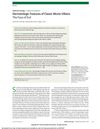 2 citations,
July 2022 in “Journal of The American Academy of Dermatology”
2 citations,
July 2022 in “Journal of The American Academy of Dermatology” People with alopecia who are more resilient tend to feel less stressed.
 9 citations,
February 2012 in “Social Semiotics”
9 citations,
February 2012 in “Social Semiotics” The document concludes that modern photo stories help represent and challenge how breast cancer affects women's identities and societal norms.
 September 2021 in “Physiology News”
September 2021 in “Physiology News” The first Conference for Black Physiologists focused on supporting Black physiologists' careers and included talks, panels, and awards.
 November 1999 in “Australian Psychologist”
November 1999 in “Australian Psychologist” The reviews highlighted practical advice and insights from various psychology and therapy books.
 May 2024 in “Research Square (Research Square)”
May 2024 in “Research Square (Research Square)” Many women in Northern Ghana use plant-based cosmetics like shea butter, and their use is more related to being married than to their job, education, or house.
 March 2024 in “Frontiers in reproductive health”
March 2024 in “Frontiers in reproductive health” Women of color in Northern Manhattan view hair care as important to their identity and culture, and education on harmful chemicals in hair products is needed.
 November 2023 in “Martor”
November 2023 in “Martor” People still turn to witchcraft for help with modern problems despite technological advances.
 September 2021 in “Physiology News”
September 2021 in “Physiology News” Air Vice-Marshal Sir Ralph Jackson significantly advanced dialysis technology in the UK.
 September 2021 in “Physiology News”
September 2021 in “Physiology News” Addressing underrepresentation in Parkinson's research is crucial for better treatments and understanding.
June 2022 in “Conjunctions” YouTube videos of men using Finasteride and Minoxidil for hair and beard growth form a unique self-tracking genre that helps build community and shape male identity.
 41 citations,
April 2017 in “JAMA Dermatology”
41 citations,
April 2017 in “JAMA Dermatology” Most classic movie villains have skin conditions, unlike the heroes, which may cause bias against real people with similar conditions.
 3 citations,
May 2010 in “Victorian literature and culture”
3 citations,
May 2010 in “Victorian literature and culture” The conclusion is that advertising is a key part of "The Pickwick Papers," reflecting the consumer culture of Victorian Britain.











